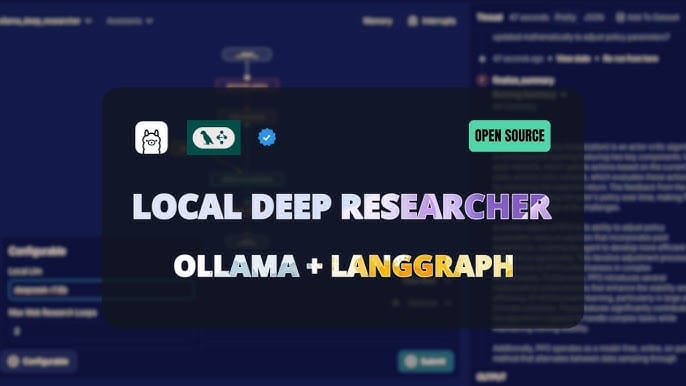Run Local Deep Researcher: A Guide to Private Web Research on Windows

Local Deep Researcher is a cutting-edge AI-powered tool that enables fully local, private web research by leveraging Ollama's local LLM capabilities. This guide covers everything from installation and configuration to advanced usage on Windows systems, all while upholding strict data privacy standards.
System Requirements and Preparation
Minimum Specifications:
- Operating System: Windows 10/11 64-bit
- Memory: 16GB RAM (32GB recommended)
- GPU: NVIDIA GPU with 8GB VRAM (e.g., RTX 3060 or better)
- Storage: 40GB free space
Required Components:
- Ollama v1.5+
- Python 3.10+
- Local Deep Researcher GitHub repository
- Preferred LLM model (e.g., Llama 3 70B, DeepSeek-R1)
Installation Process
1. Setting Up Ollama
First, install the Chocolatey package manager and then use it to install Ollama:
# Install Chocolatey package manager
Set-ExecutionPolicy Bypass -Scope Process -Force
[System.Net.ServicePointManager]::SecurityProtocol = [System.Net.ServicePointManager]::SecurityProtocol -bor 3072
iex ((New-Object System.Net.WebClient).DownloadString('https://community.chocolatey.org/install.ps1'))
# Install Ollama through Chocolatey
choco install ollama -y
After installation, initialize Ollama with your preferred model:
ollama pull llama3:70b
ollama run llama3:70b
2. Configuring Local Deep Researcher
Clone the Local Deep Researcher repository and install the required Python dependencies:
git clone https://github.com/langchain-ai/local-deep-researcher
cd local-deep-researcher
python -m venv .venv
.\.venv\Scripts\activate
pip install -r requirements.txt
Configure environment variables in a .env file:
OLLAMA_BASE_URL=http://localhost:11434
SEARCH_DEPTH=5 # Number of research iterations
SEARCH_ENGINE=google # Alternatives: bing, duckduckgo
LLM_MODEL=llama3:70b
Research Workflow Architecture
The system employs a four-stage iterative process to deliver comprehensive research results:
- Query Generation
Transforms user input into optimized search queries using semantic analysis. - Analysis Engine
Utilizes Retrieval-Augmented Generation (RAG) with:- Document chunking (1024 token size)
- Vector embeddings (using all-MiniLM-L6-v2)
- Contextual relevance scoring
- Reporting System
Generates Markdown reports with automatic citation tracking through Zotero integration.
Data Aggregation
graph TD
A[Web Search] --> B[Content Scraping]
B --> C[Metadata Extraction]
C --> D[Local Storage]
Advanced Configuration
Custom Search Parameters
Modify research_config.yaml to fine-tune search and analysis behavior:
search_params:
max_results: 15
time_limit: 1h # Restrict to recent content
domains:
- "*.edu"
- "arxiv.org"
- "ieee.org"
analysis:
similarity_threshold: 0.65
cross_validation: 3 # Number of source verifications
Performance Optimization
Optimize performance with GPU acceleration and memory management:
# Enable GPU acceleration
ollama serve --gpu --num-gpu-layers 45
# Memory management flags
set OLLAMA_MAX_LOADED_MODELS=3
set OLLAMA_KEEP_ALIVE=30m
Practical Usage Examples
Academic Research Workflow
- Monitor Progress:
Use the web UI athttp://localhost:8501to track the research workflow.
Export Results to LaTeX:
python export.py --format latex --template ieee
Initialize a Research Project:
python research.py --topic "Recent advances in fusion energy" --depth 7
Business Intelligence Application
Use the tool programmatically for business insights:
from researcher import MarketAnalyzer
analyzer = MarketAnalyzer(
competitors=["CompanyA", "CompanyB"],
financial_metrics=True,
sentiment_analysis_depth=2
)
report = analyzer.generate_report("Q2 2025 semiconductor market trends")
print(report)
Security Features
Local Deep Researcher prioritizes data privacy and security:
- Encrypted Storage: AES-256 encrypted local storage.
- Network Isolation: Uses Windows Sandbox for isolated network traffic.
- Automatic Purging: Data is purged automatically after 72 hours.
- Firewall Configurations: Customizable firewall rules for search engine communications.
Enable secure mode via PowerShell:
python research.py --secure-mode --vpn-check
Troubleshooting Guide
| Issue | Solution |
|---|---|
| GPU Memory Errors | Reduce --num-gpu-layers by 5-10 increments |
| Slow Performance | Enable the --low-vram-mode flag |
| Search API Limits | Rotate API keys using the key_manager.py script |
| Model Hallucinations | Increase --temperature 0.3 and --top-p 0.9 settings |
Comparative Analysis
| Feature | Local Deep Researcher | Cloud Alternatives |
|---|---|---|
| Data Privacy | Full local encryption[2][3] | Third-party access |
| Cost | One-time hardware expense | Recurring subscription fees |
| Customization | Full model control and configuration | Limited customization options |
| Latency | Hardware-dependent, minimal delay | Network-dependent |
Future Development Roadmap
- Multi-Agent Collaborative Research System (Q3 2025)
- Native Integration with Overleaf/Zotero (Q4 2025)
- Automated Peer Review Simulation (Q1 2026)
- Quantum-Resistant Encryption (Q2 2026)
Conclusion
This implementation combines cutting-edge AI research capabilities with enterprise-grade security. Local Deep Researcher is particularly valuable for sensitive research domains such as healthcare, legal studies, and proprietary technology development. Its iterative approach ensures comprehensive coverage of complex topics while strictly maintaining data sovereignty requirements.